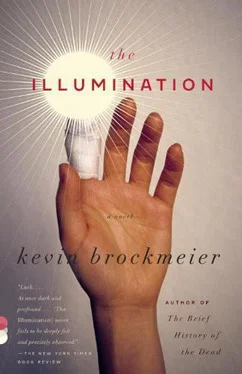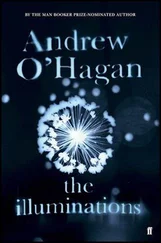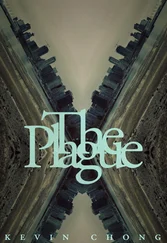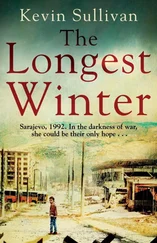It was something he had always teased her about, that runelike series of curves and squiggles in the kitchen. The pasta motif , he had called it. And now, suddenly, the sight made his stomach clench. It took the best part of his life, the only part he had ever felt he understood, and consigned it to the past. Worse, it summoned up an image he had been trying to suppress ever since he woke with his injuries shining out of his skin.
Patricia’s body as their car struck the bridge stanchion.
Her long hair whipping against the window.
Spaghetti patterns of blood on the dash.
He had always known that their time together would one day be spent. That it might be spent so soon, though, was a possibility he had never allowed himself to imagine. He was a fool. He crumpled the note up and tossed it in the trash. Then he fished it out and smoothed it flat against the counter. He couldn’t bear to read it, but he couldn’t bear to throw it away, either. He would have to put it in a file somewhere and try his best to forget about it.
That was when he remembered her journals—seven of them, each page filled from corner to corner with transcriptions of the notes he had left her. She kept them lined up on the glass and oak espresso table in the room where she exercised. Once or twice, hearing the springs of her equipment stop, he had peeked in to find her stretched out on her Nautilus or her rowing machine, paging through the journals as if they were old diaries she was investigating for traces of the thoughts that used to preoccupy her when she was young and brave, when she was unchanged. He attached the Post-it note to one of his crutches and carried himself across the house. Patricia’s exercise room had always been a sanctuary for her, the one place in the house where she could play her music, burn her candles, and sort through her baskets of yarn and crochet hooks in privacy. Now it felt overwhelmingly empty. When he flipped the light on, the objects that greeted his eye had an unusual tidiness to them, a strange and frightening aura of completeness, as if the treadmill and the storage hutch, the stereo and the upright speakers, had all suddenly become imprisoned inside their own outlines. The silhouette of a beetle whisked its legs inside the ceiling fixture. One of the pipes gave a tug beneath the house. In the quiet, the noise made him shiver.
He went to press the Post-it note into Patricia’s most recent journal, but beneath the window, on the table where it should have been, there was an empty slot with a boundary of dust around it. Where could it be? He tried to recall—had he seen the book in her hands the day of the accident? Maybe so. But when he went to the front hall and opened the box the hospital had labeled with her name, he found only her clothes, her shoes, and her pocketbook, along with a small plastic bag holding her wrist-watch and jewelry.
She had definitely taken the journal into the car with her. He was sure of it now. He remembered her clutching it to her hip as they left to meet their reservation at the restaurant. “What if I get bored and need something to read?” she had joked, whispering to him with her hand alongside her mouth, “I’ll let you in on a little secret—the guy I’m dining with today is a real snooze.” But if it wasn’t in the box, then where was it? Who would lose a dead woman’s handwritten journal? Who would steal it?
Who, as it developed, but the woman who had shared her recovery room. The hospital spent a week or more attempting to track it down before discovering that she had taken it. Apparently, she had adopted it as some sort of charm or talisman, a sad, sick symbol of God-knew-what illness or unhappiness. She had actually been reading it— reading it! —as if it were her own cache of personal letters. She had spoken with Patricia, had watched her die, had believed he was dead, too—or at least so she said. But none of that excused her, none of it healed him, none of it made his life one bit easier or brought his wife back from the dead. When she finally placed the journal in his hands, apologizing for what she called “this misunderstanding,” he felt himself shaking with relief and exhaustion. Absurdly, he found that he was afraid of dropping the book. The idea came to him that it was Patricia herself he was holding, that she had fallen and twisted her ankle, maybe, and given him her hand, and he was bearing her up as she limped through the snow. Soon they would both be inside again. He would place a pillow beneath her foot and kiss her toes one by one, starting with the pinky, and they would drink half a bottle of red wine, then wipe the stains from each other’s lips with their thumbs, and she would make a happy little upsy-daisy noise as he carried her upstairs to bed.
Instead, he brought the journal home, took it into the living room, and set it on his lap. His fingers flipped backward from the endpapers, watching as the pages filled with her handwriting. He had no need to leave the Post-it note inside, since she had already written it down. There it was in her own precise script, facing him one more time, the last sentence on a half-empty page, I love the spaghetti patterns you leave on the wall , ending with that oddly turned period of hers, like a toppled v or a bird’s beak.
One morning, some six weeks after the accident, his editor woke him from a sound sleep to ask if he knew when he would be returning to work. “I realize you’re going through a rough patch, Jason. Grieving—check. Convalescing—check. I get it, I’m with you, I understand. By all means, you should take as much time as you need. But I’m telling you, you’re missing out on some of the greatest shots of your life right now. Have you seen the stuff Dawes has been producing? Or Laskowski? Even Christman gave us a front-pager yesterday! Christman for Jesus’ sake! I’m telling you, this Illumination thing is really big. Don’t just sit there in that house of yours and turn to stone on us. I can’t believe that’s what she would want, Patricia.”
He felt like the priest of some ancient blood religion, incensed to hear her name spoken out loud. “How do you know what she would want? Maybe this is exactly what she would want.”
“You don’t mean that.”
From down the block came the mosquito-like drone of someone operating a lawn mower. Mysteriously, his anger evaporated. “I don’t, you’re right. Tell you what, Paul—I’ll try to have some images for you by the end of the week, okay?”
“Sounds good. Whenever you’re ready. No pressure from me on this end. Take all the time you need.”
Jason snapped the phone shut and went to the mirror, where he stripped off his pajamas and embarked on his customary preshower ritual, stretching his limbs and tensing his muscles to see how much light they gave off. His eye and his cheek had healed completely, as had his shoulder and his hip, his gums and incisors. One of his ribs still shone with a filmy incandescence, and a new abrasion on his elbow, tacky from scraping against the supermarket meat freezer, glittered like the mica in the sidewalk. Since his discharge from the hospital, he had been dining mainly on microwave dinners and cheap delivered pizza—salty, greasy foods that upset his digestion—and when he turned too forcefully to the side, he could see a pair of bright rectal fissures opening up behind him. Then there was the scar on his abdomen, a small red fold tattooed with a pucker of blue ink. The wound still wept with light occasionally, but only if he distended his belly. It was his knee that continued to worry him, maintaining a constant twilight glow that was run through by cruel white flares whenever he took it out of its brace, sank his weight onto it, or attempted to rotate it laterally. In short, he was still recuperating from the accident. The pain was not as bad as before, though, and he thought he could risk a walk through the neighborhood.
Читать дальше












